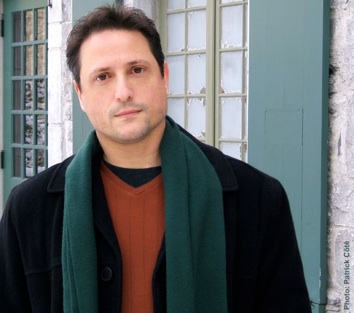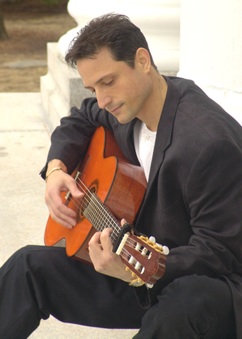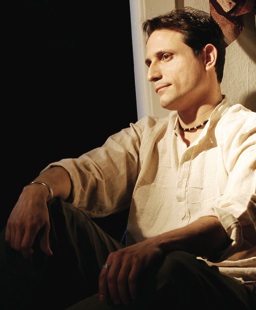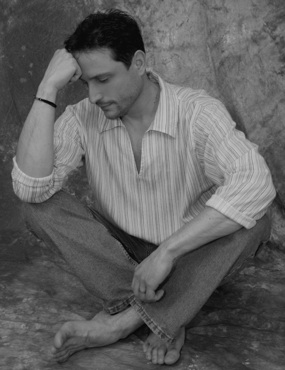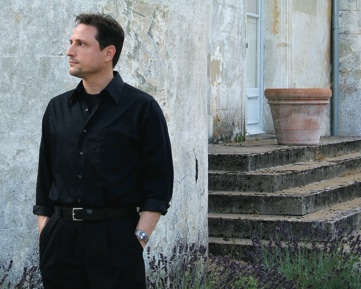I first became acquainted with Al Conti’s music when I received his 2008 release
Sheherezade for review. To put it mildly, it blew me away and became one of my favorites for the year. Conti recently released
Northern Seas, which is based on Norse mythology. This one, too, ended up on my favorites list for 2010, so it seemed like a great time to find out some more about Al Conti and his life. I knew from our correspondence that he was an incredibly nice and very interesting person, and I think this interview really underscores both. Enjoy!
KP: Hi Al, Happy New Year! How is everything with you?
Al Conti: Hello Kathy and Happy New Year to you as well! Things are great on my end and very busy with my work.
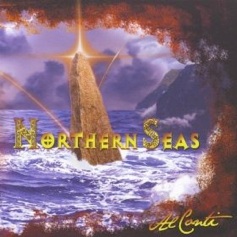
Click album covers for reviews.
KP: I just saw that Amazon has named Northern Seas as one of Top 10 Best New Age CDs for 2010. Congratulations! I would imagine that the album will be showing up on a lot of Best Of 2010 lists!
AC: Thank you! This was quite amazing to me. As with most artists, we never imagine this when we are working on a project. It is truly quite humbling when it happens. I have been extremely lucky that people have thus far accepted my work so enthusiastically.
KP: Northern Seas is your fourth album, following the very successful Scheherazade (2008). Both of these albums are concept albums that reach back into literature and cultural traditions. You say that the concepts find you, but you must have to do a lot of preparation and studying to make these concepts work so well. Let’s talk about that.
AC: I think some of the preparation comes from all the reading I have done since I was a child. I have always loved books and found that they provided me with a window onto unknown worlds. Once a concept “chooses me,” I put all my focus on researching not only the concept, but also the music styles and instruments native to that part of the world. Family, friends and collaborators who know of a project early on often buy me books and CDs that relate to a particular project. I have piles of books about the myths of the Norse and the Arabian Nights around the house! I do tend to immerse myself completely in the literature and music that I am interested in – it really is an adventure and a discovery. I will sometimes stop in the middle of working on a piece and pull out a relevant book to read a few pages.
KP: That’s really interesting! Is this music that can be performed in concert? Have you played any of it live?
AC: Although my work can be performed in concert, I do not currently perform live. I did much of that when I was an actor, but what I always preferred was television and film acting, in which the audience is very real, but not necessarily there. Also, my music is very complex and to perform it I need a troupe of at least 12 musicians, not to mention a large crew. As many artists will tell you, touring is exhausting. I tend to be an extremely private person and need much time alone for the creative process, which one does not get when touring. I traveled a lot in my life, often feeling like a bohemian, and one of the things I treasure most these days is being in the familiar environment of home and feeling connected to a community – online communities also provide access to people who enjoy my music – I always feel connected.
KP: Do you know what your next project is going to be?
AC: I am pretty sure of what my next project will be. The concept is there, but the timing is not yet right to begin. Still, I guess as most superstitious actors will say, I rather not speak yet of what my next project will be so as not to jinx it! Of course if I mention it to friends, I may end up with more piles of books and CDs!
KP: From what I’ve read, you have had a really interesting and colorful life. Let’s talk a little bit about your early life - where you grew up and what your family life was like.
AC: The funny thing is that the one who has a colorful life doesn’t necessarily see it that way. I have had people tell me how envious they were knowing I traveled and lot in my life, living in different countries and cultures. I often say that I am the one who is envious since I cannot imagine the comfort of living in one place for most of one’s life. In Argentina, it is not uncommon for friendships to feel more like family – for example, I have friends today whose grandparents were friends of my grandparents and that continues right down to this day. I miss that continuity and shared experience even though we stay in touch. Living in Vermont, I have dear friends who were born and raised here and have friends and family in one place. That is wonderful to me. Luckily, my parents now live just a few minutes away from me.
Regarding my early family life, it was a bit difficult, although I have amazing parents and siblings. I was somewhat of a difficult child. In part, I have a learning disability, which was not identified until I was having a horrendous time in college. I was also identified as what is called a ‘Highly Sensitive Person’ and MBTI (the Myers-Briggs Personality Type Indicator) places me in a group with less than 2% of the U.S. population. It took many years for me to understand why I functioned as I did, and how the world functioned the way it did, and find ways to reconcile both. The fact that I had a very safe and loving family environment helped tremendously. And perhaps that is why I find the warmth of family and friends so comforting.
KP: How did you become interested in music?
AC: My mother was a classical ballerina and her father a concert pianist, so very early in my life I was exposed to quite a bit of music. The bio that we put out talks about how my parents used to play a game with me when I was about 4, asking me to put a specific record on their record player and I’d go directly to it, pop it on without seemingly even thinking about it. Usually it would be something like ‘Swan Lake,’ ‘Giselle’ or some other ballet. I also grew up surrounded by music from around the world, as Argentina was and still is deeply steeped in world culture and the arts.
KP: Did you take music lessons or training or are you self-taught?
AC: I tried formal learning but failed miserably, perhaps because I learn differently than the average person. As I mentioned, I have a learning disability, so learning to read and write music was almost out of the question for me. What I do is pretty much self-taught. This used to be very difficult for me, as I lacked the self-esteem to feel that I was any good because I did not possess any structured training. One day, a very successful classically trained musician I know told me that I was actually blessed, because many who are formally trained do not have such freedom to compose; that they often feel constrained by structure and form. I think that was a turning point for me.
KP: When did you know you wanted to be an actor?
AC: I was three years old when I told my parents I was going to be a ‘dramatic actor.’ You may imagine they got a chuckle or two out of it, but as I grew older it was clear that I was serious.
KP: How did you get started in the acting field?
AC: My poor parents had enough of my begging, so when I was about 8 or 9 they enrolled me in acting classes. After that, I started performing in theater at first, then television and film, which was ultimately my goal. I was 4 or 5 and would stand in front of the television and tell my parents I was going to be ‘in’ there. There was never any question in my mind that this was why I had been born – to act.
KP: Is that what brought you to the US? What year was that?
AC: Actually what brought me to the US was my family. The situation in Argentina in the 70’s was awful and at some point in 1980 my parents had enough. There were several times in my childhood when my family escaped torture and death only because they knew someone in the right place. It finally got to where my parents felt they needed to escape the pressure and stress, so we moved to the U.S. because we had friends here. Not long after that, we moved to Northern Italy where some of my mother’s family still reside. We moved back and forth a few times, but I finally returned to stay in the U.S. when I was 17. That was 1985. I finished the last six months of High School in the U.S.
KP: What are some of the movies, television programs, and commercials you appeared in?
AC: I don’t often talk about my acting life, since music is my full time career now. There are several plays that made it into my public bios and other credits such as ‘As The World Turns.’ There are also a few commercials that aired for longer periods of time. And a while back some reviewer confused me with another Al Conti and wrote that I had appeared in some mini-series back in 1980 playing some detective (not very believable, since I was only 12 at the time!). To avoid more confusion, I just stick with speaking about the music now.
KP: That’s funny! Did you gradually gravitate into music or was it more of a sudden decision?
AC: Music came gradually and completely unintentionally. I have been composing since I was about 20, but mostly for myself. There has always been a lot of music inside me and it just needed to be channeled out somehow. I never set out to make music my career. That was a total surprise to me.
KP: When did you write your first piece of music?
AC: I would say probably when I was about 6. In my head I composed a whole new version of a popular children’s song. My mind was already geared that way. But seriously, my real composing began when I was about 20. In fact, ‘Scheherazade’ and ‘Northern Seas’ both contain one song each that I composed many years ago and with the right adaptation fit into the concepts. Still, throughout my life listening to music, studying how composers did what they did and trying in my head different arrangements was something that I did consistently. I could be a very active listener.
KP: I haven’t heard your first two CDs. Were they also concept albums or more “normal” compilations of pieces?
AC: My first album ‘Shadows,’ which I later chose to remove from the catalog for personal artistic reasons (although it is still out there as a download), was a compilation of material I had composed over several years, not really intended for release. My second album, ‘Poeta,’ was composed loosely as a concept album. However, my album ‘Scheherazade’ would change the way I compose and mark a turning point in my musical career.
KP: Which instruments do you play?
AC: Mostly piano and guitar, both of which I use to compose and feature in my music. However, my work features many instruments, both played live by myself and others or sampled. I make it a point to learn as much as I can about every instrument that is featured in my work, because I have to compose using these instruments and ensure that they can be played realistically if sampled, or to not make life too difficult for a guest artist when recorded in studio.
KP: I’ve read that you’ve been a world traveler for most of your life and have lived in a variety of places. Tell us about that.
AC: Well, some I mentioned already. By the time I was 14 I had already lived in various cultures and spoke three different languages. While this may seem somewhat glamorous to some, I feel it actually did some damage to me. Moving from culture to culture and all over the map at very critical ages created some issues that I spent many years in therapy trying to resolve! In fact, psychology was going to be my second career had school not been such a harrowing experience for me. I was always fascinated by how I and others function. Needless to say, this was the main element that aided me in my acting work.
KP: Are there places you still haven’t seen that you’d like to visit? Any favorites?
AC: Yes, a few. I would love to visit Japan and have always felt a connection to that culture. I also visited the North of France for the first time last year and was very moved by both the people and the landscape.
KP: It sounds like you do a lot of charitable work. What are some of the charities that you work with?
AC: Yes, I try to. I currently sponsor The Leukemia & Lymphoma Society, the Until There’s A Cure Foundation, and The Alzheimer’s Association. My life has been touched deeply by all three diseases and I felt the need to be involved in some way to continue to bring attention to them. It is only recently that I have spoken publicly about my 23-year-old nephew passing away from Leukemia shortly after ‘Scheherazade’ was released. I was not there when he passed away, but was told that my music was playing for him all that night until he left in the early morning hours. This was extremely moving for me. Also, having been in the entertainment world for most of my life I had many dear friends who have left us because of AIDS and this has always been a very important cause to me. Alzheimer’s is also something that has touched me deeply through people who are very dear to me.
KP: It’s so great to be able to make a difference in these important causes! Who and what are some of your musical influences?
AC: I have been asked this before and quite frankly cannot name just a few. Music has been a part of me since I can remember and I have absorbed everything like a sponge. I think I am the product of everything that is musically out there. I mentioned recently in an interview that my iPOD has over 18,000 songs, so that pretty much says it all. Originally I’d like to say that classical music and film scores impressed on me what I now create, but there are very few genres of music that I don’t like. For the most part, I find the beauty in most of what I hear.
KP: Who are your favorite composers?
AC: There are many, many composers out there that I respect and admire, but it would take a whole interview on just this question. I can say Chopin is my favorite classical composer and I can remember his piano concerto No.1 and Prelude No.4 haunting me when I was about 5 years old. They played in my head constantly. I think that right now there are many amazing artists out there and I have been extremely privileged to be in their company on charts and ‘Best of’ lists.
KP: Who are some of your favorite performers?
AC: Again, many, but I do not have just one favorite. When it comes to singers, I have always been partial to very clear, crisp voices. I have also always loved harmony. Karen Carpenter is a voice I love. The ABBA lead singers have also been at the top of my list for incredible harmony and range.
KP: What has been your most exciting musical moment or experience so far?
AC: I think that the most exciting moments in my career are the ones in which someone reaches out to me and tells me just how much my music has helped them through a hard time in their life. I recall a specific e-mail I received from a psychotherapist. She wrote to tell me that she had developed a program using my music to help soldiers returning from Iraq. She wanted to tell me just how much I had done for our troops. Things like that are awe inspiring to me and touch me deeply.
KP: Wow! I guess so! If you could have any three wishes, what would they be?
AC: Oh, the million dollar question! I would say health for my loved ones, a world in which everyone allows everyone to follow their path without judgment and, if this last one works, give me unlimited wishes!
KP: What’s up next for you?
AC: We are currently in talks over several licensing agreements, so that may be my most present work right now and, of course, getting a new project off the runway.
KP: Is there anything else you’d like to talk about?
AC: In fact there is. There is an issue that I have remained very silent about until recently, that of pirated and illegally downloaded music. In one way, I feel that we are extremely disrespected as artists when people assume that we should be doing our work for free. I have seen fellow artists having to lay off staff because they cannot afford to pay them anymore due to the loss of income from piracy and it is extremely sad for me to see this. Some people do not seem to realize that as artists, we are responsible sometimes for the jobs of many others such as guest artists, engineers, photographers, designers, accountants, and the list goes on. When someone steals the music we are putting out there, they are hurting a lot of people. There is also the assumption that artists are a product of a major label, which they consider to be a ‘fat cat corporation.’ This is very inaccurate, as a large percentage of artists in the industry right now are independent and living on what they make from their work. Still, even the so-called ‘fat cat corporations’ employ thousands of people who ultimately make a living from music sales and this does not excuse people from stealing. It is estimated that illegal downloads of music are costing the entertainment industry billions of dollars and hundreds of thousands of jobs in the U.S. alone, at a time when the economy and people are suffering deeply.
On the other side of the coin, many people simply do not realize the harm they do when they download music illegally as many do not even realize they are doing it. There are many websites out there that claim to be legitimate, yet are not. This is also a growing concern to me, because many in my audience may think they are buying my music from a reputable site, yet they are being scammed. Many of these illegal download sites are run from countries where no copyright enforcement exists. These sites take people’s financial information and then run with it. Most of us artists can opt out through our distributors from being in countries that are so lax, but our music still ends up there. Most of us try and make sure that our websites have links to reputable, safe sites that protect our rights. We work hard for what we do and most of us struggle in this business.
KP: Very well said!
AC: Thank you so much – these were great questions! I really enjoyed answering them. And thank you also for everything you do for independent artists.
For more information about Al Conti and his music, please visit
his website and his
Artist Page here on MainlyPiano.com.
Kathy Parsons
January 2011

